|
|
|
Sort Order |
|
|
|
Items / Page
|
|
|
|
|
|
|
| Srl | Item |
| 1 |
ID:
118918
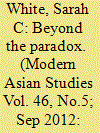

|
|
|
|
|
| Publication |
2012.
|
| Summary/Abstract |
This paper reflects on the apparent 'paradox' of a contemporary Bangladesh that appears both 'more modern' and 'more Islamic', focusing on changes in the family (and the gender and generational orders that it embodies) as a central locus of anxiety and contestation. The paper begins with theory, how the paradox is framed by classical social science expectations of religious decline and how this has been contested by contemporary writers who describe specifically modern forms of piety. It then turns to Bangladesh, where highly publicized symbolic oppositions between 'religion' and 'development' contrast sharply with people's pragmatic accommodation of development goods in everyday life. Analysis of religious references in interview data reveal the co-existence of very different understandings: a more traditional view of religion as embedded in the moral order; and a more modern deliberate cultivation of a religious life. They also reveal how many of the uses which people make of religion are not specifically religious: to conjure a moral universe, to mark what is important to them, to say things about themselves. The final section returns to theory, reflecting on how this is informed by the findings from Bangladesh, and suggesting that the importance of the private and personal as a site for governance offers a further dimension of why the supposed 'paradox' of a religious modernity may not be so paradoxical after all.
|
|
|
|
|
|
|
|
|
|
|
|
|
|
|
|
| 2 |
ID:
118914
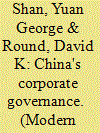

|
|
|
|
|
| Publication |
2012.
|
| Summary/Abstract |
As China approaches economic superpower status, its need to achieve considerably higher standards of corporate governance is becoming paramount. Despite impressive recent advances in its capital and stock exchange markets, the on-going overhang of state ownership in its former state-owned enterprises, together with an unwieldy and ineffective dual board governance system, has left China facing major corporate governance problems that will deter the private investment necessary for its continued growth. This paper illustrates these problems, and suggests possible reforms that will provide the foundation for the efficient further development of China's capital markets that is needed to help China become a major economic superpower.
|
|
|
|
|
|
|
|
|
|
|
|
|
|
|
|
| 3 |
ID:
118910
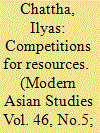

|
|
|
|
|
| Publication |
2012.
|
| Summary/Abstract |
This paper explores the part that the redistribution of evacuee property-the property abandoned by departing Hindus and Sikhs during the mass migrations after Partition-played in the institutionalization of corruption in Pakistan. By drawing on hitherto unexplored sources, including Pakistan's Rehabilitation Department papers, local police files and court records, it highlights the schemes of illegal appropriation, misappropriation, and paints a wholly convincing portrait of the scramble for millions of rupees worth of abandoned property in the towns and countryside of West Punjab. It shows how politicians, bureaucrats, powerful local notables and enterprising refugee groups grabbed properties, mainly by bribing officers charged with allocating them to incoming refugees, or by utilizing their personal contacts. The paper argues that the fierce competition for resources and temptations for evacuee property encouraged the emergence of a 'corruption' discourse which not only contributed to an atmosphere that was detrimental to democratic consolidation in the early years of Pakistan's history, but also justified later military intervention. This not only adds to the empirical knowledge of Partition and its legacies, but also makes a significant contribution towards our understanding of the transitional state in Pakistan.
|
|
|
|
|
|
|
|
|
|
|
|
|
|
|
|
| 4 |
ID:
118907


|
|
|
|
|
| Publication |
2012.
|
| Summary/Abstract |
The English East India Company established a factory on the island of Condore, off the coast of southern Vietnam, in 1702 as part of its plan to maintain a settlement to direct shipping activities between trading ports in China and Southeast Asia and India. For three years, the settlement thrived and was an important part of the China trade network, especially as a stopping point for ships plying the China route. The island settlement also carried out trading activities with neighbouring ports along the Indochina coast and the Malay Archipelago. The setting up of the factory, however, coincided with the emergence of the new entity of southern Vietnam under the Nguy?n family who were expanding their power-base to the south. In the process, the Nguy?n had already subdued the Chams and were coming face-to-face with the Khmers when the English factory was established. This paper will trace the English venture on Condore Island and the reaction of the Nguy?n ruler towards this venture which culminated with the destruction of the factory in 1705. This paper will attempt to explore the following questions: the shifting importance of the islands in the Nguy?n's security and foreign relations vis-à-vis the English factory, and will also investigate the circumstances that brought about the massacre and destruction of the English factory on Pulo Condore-a historical event that has not been properly explained thus far.
|
|
|
|
|
|
|
|
|
|
|
|
|
|
|
|
| 5 |
ID:
118908
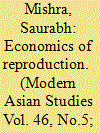

|
|
|
|
|
| Publication |
2012.
|
| Summary/Abstract |
The expansionist policies of the early colonial regime led to a significant emphasis on the importance of a large cavalry, but horses of a suitable quality appeared difficult to obtain within the subcontinent. Several measures were consequently taken to encourage horse-breeding, including the establishment of government studs and policies directed towards the creation of a 'native' market in quality horses. However, these measures did not appear to produce any significant results, despite sustained implementation. This paper examines in detail colonial policies on horse-breeding and links them to the larger economic logic of empire. It touches on several related themes such as early colonial interaction with 'native' agents, the question of free markets, and the impact of utilitarian and physiocratic doctrines on colonial policies.
|
|
|
|
|
|
|
|
|
|
|
|
|
|
|
|
| 6 |
ID:
118911
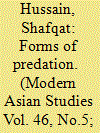

|
|
|
|
|
| Publication |
2012.
|
| Summary/Abstract |
In this paper I compare late nineteenth and early twentieth-century sport hunting of markhor, a mountain goat, by British civil and military officials in the mountainous northern frontier region of Kashmir State, with their hunting of tigers, particularly man-eating tigers in the hilly and plains regions of India. Using these two instances, this paper elucidates and compares two competing visions of colonial governance. The British sportsman hunted man-eating tigers in order to protect Indian society from wild nature. Hunting them was also symbolic of their welfare-oriented governance ideology. They also hunted markhor in the northern mountainous region using begar, or forced labour, which they justified by falling back on the wider colonial representation of the northern mountainous region as a civilization-less area, where a more coercive form of governance was needed. So, rather than protecting society from nature, as in the case of man-eating tiger hunting in the plains, what was needed in the mountains was the ability of the British to introduce civilization into unruly nature via a strong disciplinary force. I argue that colonial governance entailed not simply a struggle to civilize India and its population, but a more profound struggle for control over nature.
|
|
|
|
|
|
|
|
|
|
|
|
|
|
|
|
| 7 |
ID:
118906
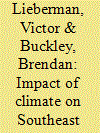

|
|
|
|
|
| Publication |
2012.
|
| Summary/Abstract |
The recent discovery of continuous tree-ring series starting as early as 1030 CE has for the first time made possible the reconstruction of historical climates for much of mainland Southeast Asia. Perhaps the most dramatic finding is that wide cyclic fluctuations in the reach and volume of monsoon rains contributed substantially to both the genesis and the collapse of the charter civilizations of Angkor, Pagan, and Dai Viet. From circa 1450-1820 climate continued to influence political and economic development, but its impact appears to have diminished both because the amplitude of hydrological fluctuations decreased markedly, and because new sources of power rendered early modern Southeast Asian states more resilient. A pioneering collaborative effort by a historian and a paleoclimatologist, this paper promises three benefits: It can help to solve a variety of local historiographic puzzles, it can facilitate construction of a synchronized historical narrative for mainland Southeast Asia as a whole, and it can aid comparisons between mainland Southeast Asia and other sectors of Eurasia.
|
|
|
|
|
|
|
|
|
|
|
|
|
|
|
|
| 8 |
ID:
118917
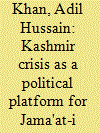

|
|
|
|
|
| Publication |
2012.
|
| Summary/Abstract |
This paper looks at Jama'at-i Ahmadiyya's political involvement in the Kashmir crisis of the 1930s under its second and most influential khalifat al-masih, Mirza Bashir al-Din Mahmud Ahmad, who took over the movement in 1914, six years after the death of his father, Mirza Ghulam Ahmad. Communal tensions springing from the Kashmir riots of 1931 provided Mirza Mahmud Ahmad with an opportunity to display the ability of his Jama'at to manage an international crisis and to lead the Muslim mainstream towards independence from Britain. Mahmud Ahmad's relations with influential Muslim community leaders, such as Iqbal, Fazl-i Husain, Zafrulla Khan, and Sheikh Abdullah (Sher-i Kashmir), enabled him to further both his religious and political objectives in the subcontinent. This paper examines Jama'at-i Ahmadiyya's role in establishing a major political lobby, the All-India Kashmir Committee. It also shows how the political involvement of Jama'at-i Ahmadiyya in Kashmir during the 1930s left Ahmadis susceptible to criticism from opposition groups, like the Majlis-i Ahrar, amongst others, in later years. Ultimately, this paper will demonstrate how Mahmud Ahmad's skilful use of religion, publicity, and political activism during the Kashmir crisis instantly legitimized a political platform for Jama'at-i Ahmadiyya's entrance into the mainstream political framework of modern South Asia, which thereby has facilitated the development of the Ahmadi controversy since India's partition.
|
|
|
|
|
|
|
|
|
|
|
|
|
|
|
|
| 9 |
ID:
118909
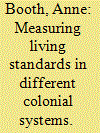

|
|
|
|
|
| Publication |
2012.
|
| Summary/Abstract |
This paper investigates the evidence on living standards in colonial economies, with particular reference to South East Asia in the decades from 1900 to 1942. Various measures are investigated, including availability of basic needs, demographic indicators, especially mortality rates, anthropometric measures and wage data. The paper concludes that in spite of the growth in GDP which occurred in most parts of the region between 1900 and 1940, improvements in living standards were modest, and by the late 1930s most colonies had low educational enrolments and high mortality rates. The Philippines had probably the highest living standards in the region, using educational indicators, mortality rates and per capita GDP estimates. But even in the Philippines rice availability per capita was low, and nutritional levels among some segments of the population were also below acceptable standards.
|
|
|
|
|
|
|
|
|
|
|
|
|
|
|
|
| 10 |
ID:
118916
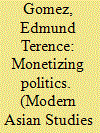

|
|
|
|
|
| Publication |
2012.
|
| Summary/Abstract |
This paper assesses the patterns of financing of political parties and elections in Malaysia. The poor regulation of the activities of parties and of all forms of political elections has contributed to allegations of covert funding of politicians, from both Malaysian and foreign sources. Since parties have grossly unequal access to funds, this has led to unfairness in federal and state elections. This paper also deals with two fundamental issues in the financing of politics. First, Malaysia is one of very few countries where parties own corporate enterprises, a trend known as 'political business'. Second, money-based factionalism, known as 'money politics', is threatening the existence of parties and undermining public confidence in government leaders. Party factionalism is based not on ideological differences but on which political leader has the greatest capacity to distribute funds to capture grassroots-level support. Two core issues contribute to the extensive monetization of politics. First, existing disclosure requirements do not adequately restrict the covert funding of politics or ensure electoral fair play. Second, public institutions that oversee electoral competition are not sufficiently autonomous to act without favour. Finally, this paper reviews the levels of transparency built into current legislation, the pattern of financing of parties and electoral campaigns, and the relevant regulatory bodies' institutional capacity to ensure fairness and accountability during elections. The paper proposes legislative and institutional reforms to ensure electoral fairness, within and between parties.
|
|
|
|
|
|
|
|
|
|
|
|
|
|
|
|
| 11 |
ID:
118915


|
|
|
|
|
| Publication |
2012.
|
| Summary/Abstract |
This paper is concerned with the operational activities of the public security organs of the People's Republic of China during the immediate post-1949 period of regime consolidation. The main part of the paper is a case-study of a 1950 pilot scheme to recruit agents in critical sectors of industry and trade in the city of Yingkou in Northeast China, a scheme in due course subsumed under a nationwide programme with a similar focus. In the years to follow, the operational recruitment of agents would become one of China's arguably most important operational responses to the twin Cold War threats of economic espionage and-above all-sabotage. This paper's findings suggest, with respect to operational activities, that in order to represent and explain more fully, in Leopold von Ranke's words, 'how things really were', social and political historians may well want to shift their focus away from successive highly public Maoist 'mass movements' and look instead to what transpired out of the public eye in the interregnum of ordinary times that such movements punctuated. If and when they do, they will discover significant yet hitherto largely unexplored similarities between the work of the early People's Republic of China public security organs and their counterparts in the Soviet Union and other (former) socialist states.
|
|
|
|
|
|
|
|
|
|
|
|
|
|
|
|
| 12 |
ID:
118913


|
|
|
|
|
| Publication |
2012.
|
| Summary/Abstract |
Drawing principally upon a rich vein of previously unexploited business records, this paper analyses the experience of British firms in Indonesia between the achievement of independence and the beginnings of the Suharto regime. As in The Netherlands East Indies, British enterprises occupied a significant position in post-colonial Indonesia in plantations, oil extraction, shipping, banking, the import-export trade, and manufacturing. After the nationalization of Dutch businesses from the end of 1957, Britain emerged as the leading investing power in the archipelago alongside the United States. However, during Indonesia's Confrontation with British-backed Malaysia (1963-1966), most UK-owned companies in the islands were subject to a series of torrid (albeit temporary) takeovers by the trade unions and subsequently various government authorities. Most of these investments were returned to British ownership under Suharto after 1967. But, in surviving the Sukarno era, British firms had endured 15 years of increasing inconvenience and insecurity trapped in a power struggle within Indonesia's perplexing plural polity (and particularly between the Communist Party and the military). Indeed, the Konfrontasi takeovers themselves, varying in intensity from region to region and from firm to firm, were indicative of deep fissures within Indonesian administration and politics. The unpredictable and unsettled political economy of post-colonial Indonesia meant that the balance of advantage lay not with transnational enterprise but with the host state and society.
|
|
|
|
|
|
|
|
|
|
|
|
|
|
|
|
| 13 |
ID:
118912
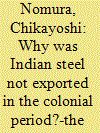

|
|
|
|
|
| Publication |
2012.
|
| Summary/Abstract |
While various scholars of Indian economic history have focused on the progress of import substitution in India after the 1920s, few have studied why this led to hardly any export of industrial products during the colonial period. One of the most probable reasons for the lesser popularity of this issue could be attributed to a commonly shared view that there was less hope for the export of industrial products in colonial India since import substitution had progressed only so far. Although it is accepted that the industrial development of colonial India was generally stagnant, this does not necessarily apply to specific products in specific industries. For instance, the iron and steel industry achieved almost a full self-sufficiency rate for some of its steel products during the 1920s, although the industry hardly exported the products afterward. This paper aims to clarify why hardly any steel of the Tata Iron and Steel Company (TISCO), the only steel producing company with modern technology until the mid-1930s, was exported. A detailed study of the company's archives will show that the steel export of the company was fundamentally hindered by a fact which had its origin in British imperial policy: the strict quality specifications in the production of steel.
|
|
|
|
|
|
|
|
|
|
|
|
|
|
|
|
|
|
|
|
|